Who’s the Best Underwater? Inside the Army’s Combat Diver Competition
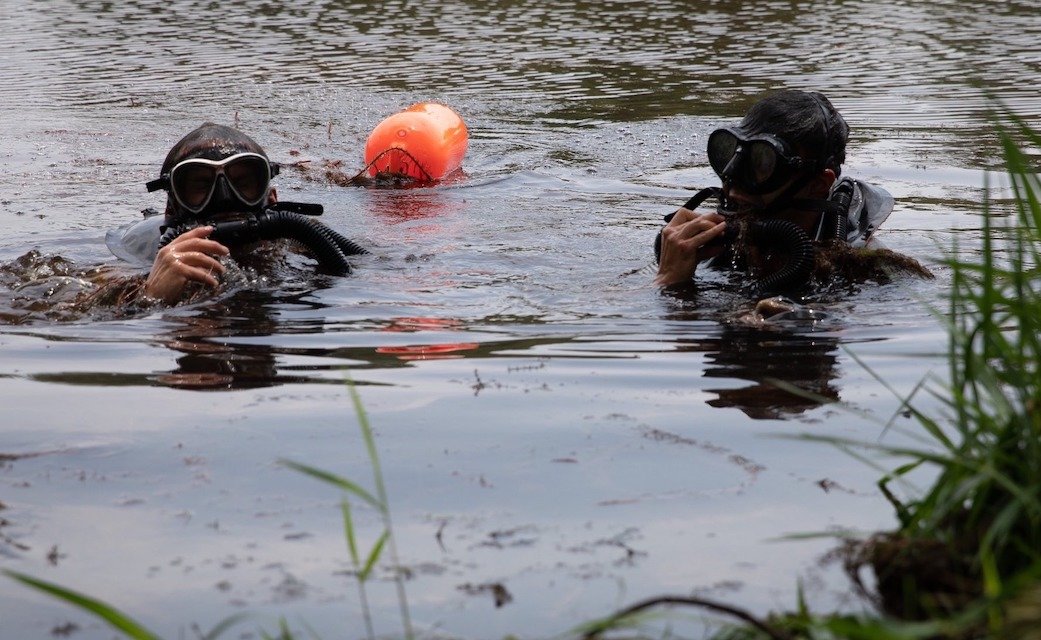
A combat dive team emerges from a navigation swim. When underwater, the team tows an orange buoy so officials on the surface can track their progress. Photo courtesy of 3rd Special Forces Group.
A line of orange buoys snaked across the black water of McKellars Pond on Fort Bragg. On the banks, spectators stood quietly as the markers progressed, one by one, between a series of floating checkpoints, each about 100 meters apart. Though those on dry land could see only the slow movement of the orange buoys, each marked the progress of a team of two Special Forces combat divers just below the surface, navigating as a team. Not even bubbles gave them away.
Using only an underwater compass, the dive teams zigzagged between the targets — one, two, three, four. The black water conditions meant the divers might not be able to see their own hands, let alone a checkpoint a few meters away. As the event progressed, one team’s buoy veered off course from a target, toward the shoreline.
“They’re going long,” a timekeeper said, just as the team collided with the bank on the far side of the pond.
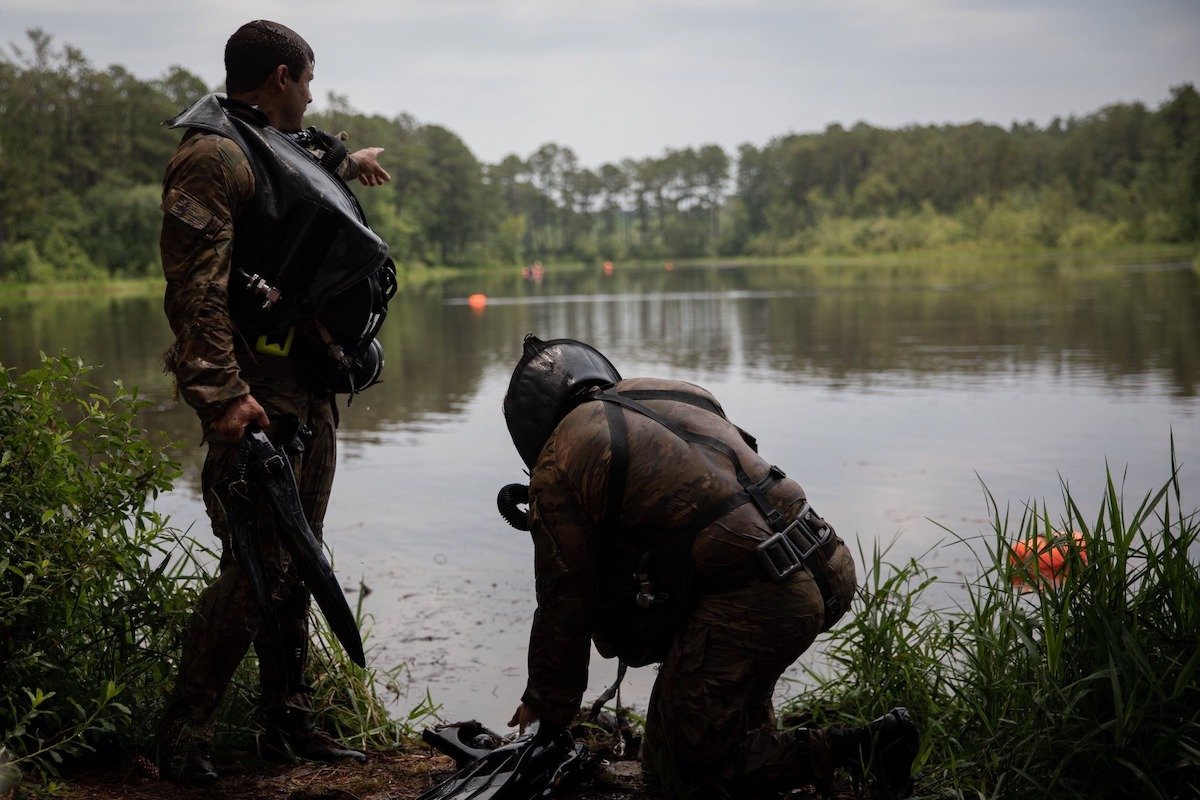
In all, nine teams took their turn navigating the star-shaped course, the first element of the final challenge of the 2022 Best Combat Diver Competition.
As the divers made their way to the finish line, marked by a red-and-white dive flag, one team veered nearly 40 yards off mark. “I’ll get them,” a timekeeper said, before chasing down the strays. The next team missed by 10 yards, but the one after them beelined for the flag. The orange buoy steadily approached the shore until shadowy forms were visible just beneath the surface. Their heads broke the water, then their goggles.
The pair grinned and stood up. Success. They waded the last few feet to the dive flag, dragging grass, branches, and soaked cammies ashore. “It feels like I’m in a ghillie suit,” one diver said. They plopped to the ground and disentangled.
“All good?” asked a dive master.
“All good,” the divers replied, shrugging off their rigs, specially designed rebreather systems that — unlike traditional scuba gear used by most civilians — recirculate and scrub a diver’s exhalations, releasing no bubbles that would leave a telltale trail on the surface above.
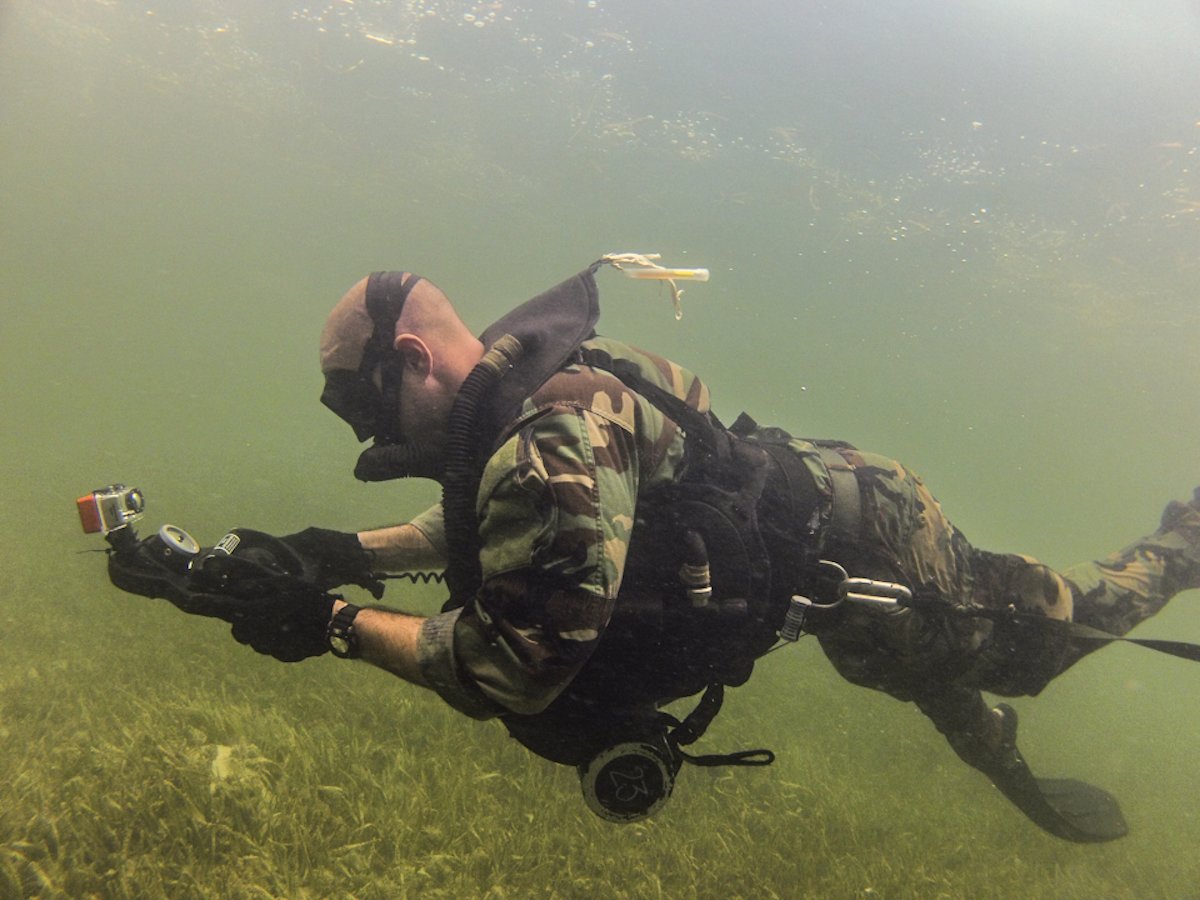
Once the dive master was sure the pair had no adverse medical effects from the dive, the team scrambled down a ravine into a culvert of waist-deep mud for the final element of the challenge: a shooting event at a range across the street.
After all, a dive operation is just a way for special operators to get to work.
Dive, Run, and Shoot
Sgt. 1st Class Rob and Staff Sgt. Joe — who asked to be identified only by first names — organized the competition at Fort Bragg.
“Over the last 20 years, I think [dive] has gone to the wayside with the wars in the desert, and as a result, we’re kind of the redheaded stepchild of the group.” Rob said. “Our goal with [the Best Combat Diver Competition] is to bring more awareness to the maritime community and the dive community.”
Hosted by Fort Bragg’s 3rd Special Forces Group and presented by the Combat Diver Foundation, a nonprofit organization, the second annual competition wrapped on Thursday, June 16. Nine teams participated over two days, including elite divers from the Army’s 1st, 3rd, 5th, and 7th Special Forces groups as well as one competitor from the Air Force’s 14th Air Support Operations Squadron.
Two Green Berets from 7th Special Forces Group claimed the title. Events included pool events, a 5-mile run in almost 90-degree heat, a written test, boat maneuvers, and the final navigation dive and shooting scramble. At the pool, competitors faced obstacle courses that included rescuing a 300-pound dummy and assembling a Glock 19 underwater while wearing blacked-out goggles.
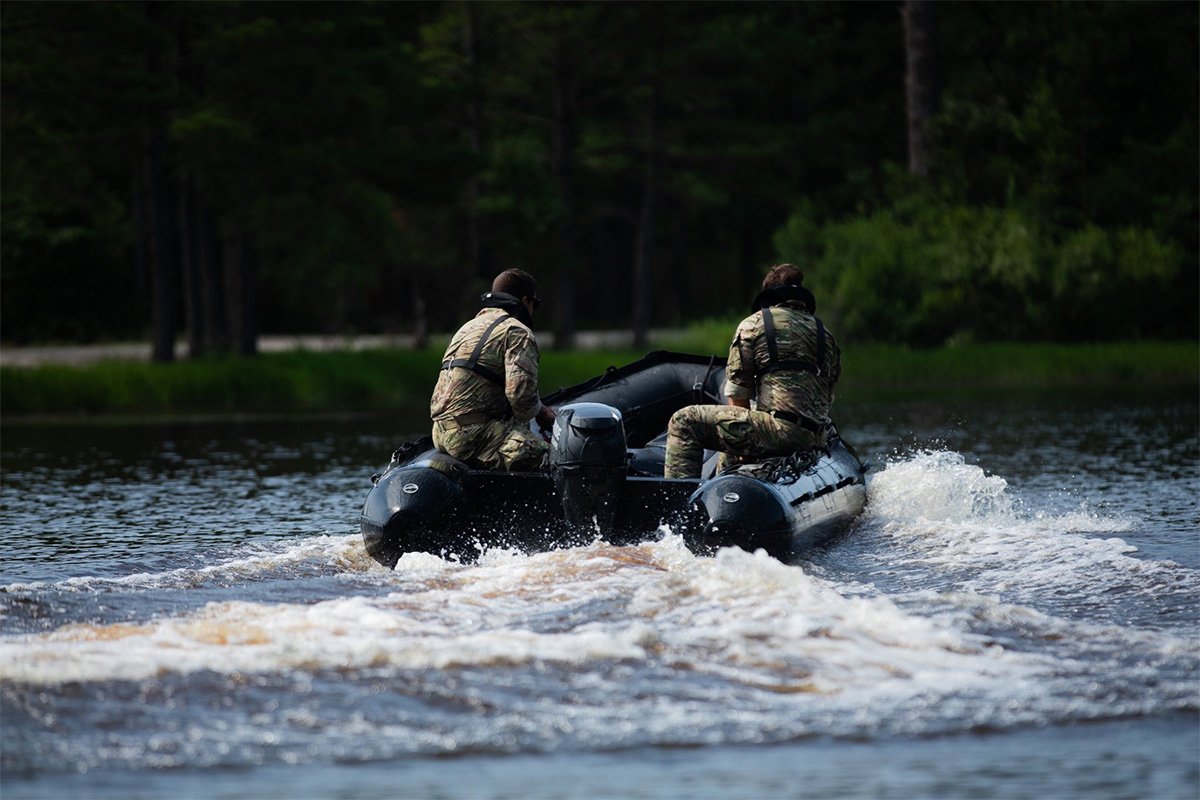
Combat diver is not a job in the Army but a qualification that many special operators earn by completing extensive training that is widely viewed as among the military’s most grueling. Divers learn how to conduct maritime missions and gain access, undetected, to waterfront targets. Combat divers learn the basics of small boat infiltration and underwater navigation, often swimming with the same equipment that a soldier would normally carry on their back.
The competition at Fort Bragg tested the whole diver, challenging strength and speed as well as technical know-how. Sgt. 1st Class Mike, who came up with the idea for a Best Combat Diver Competition for Army divers, was impressed with this year’s events. “Last year was more endurance events. This year, we got into a lot more technical events, which is awesome,” he said.
Who’s the Best?
The soldiers and organizers of the event have hopes that the contest will grow to include the other military branches with combat dive missions. The Marines and Air Force both run independent dive qualification courses similar to the Army’s, while Navy SEALs undergo combat dive training as part of their initial qualification. Militarywide, sniper competitions take place regularly — including one on Fort Bragg for special operations teams — and other contests like Best Ranger regularly draw entrants from units around the world. But combat diving, despite being practiced in most special operations teams across four branches of the military, has no such central event.
So which branch really has the best combat divers? It’s a question, organizers say, that can only be answered with robust participation from across the military branches.
“Last year we had six teams: five teams from 3rd Group, one team from 7th Group,” Mike said. “This year we have nine teams.” Representation grew to include teams from four out of five active-duty Special Forces groups and one Air Force Tactical Air Control Party specialist, or TACP, who partnered with an Army diver.
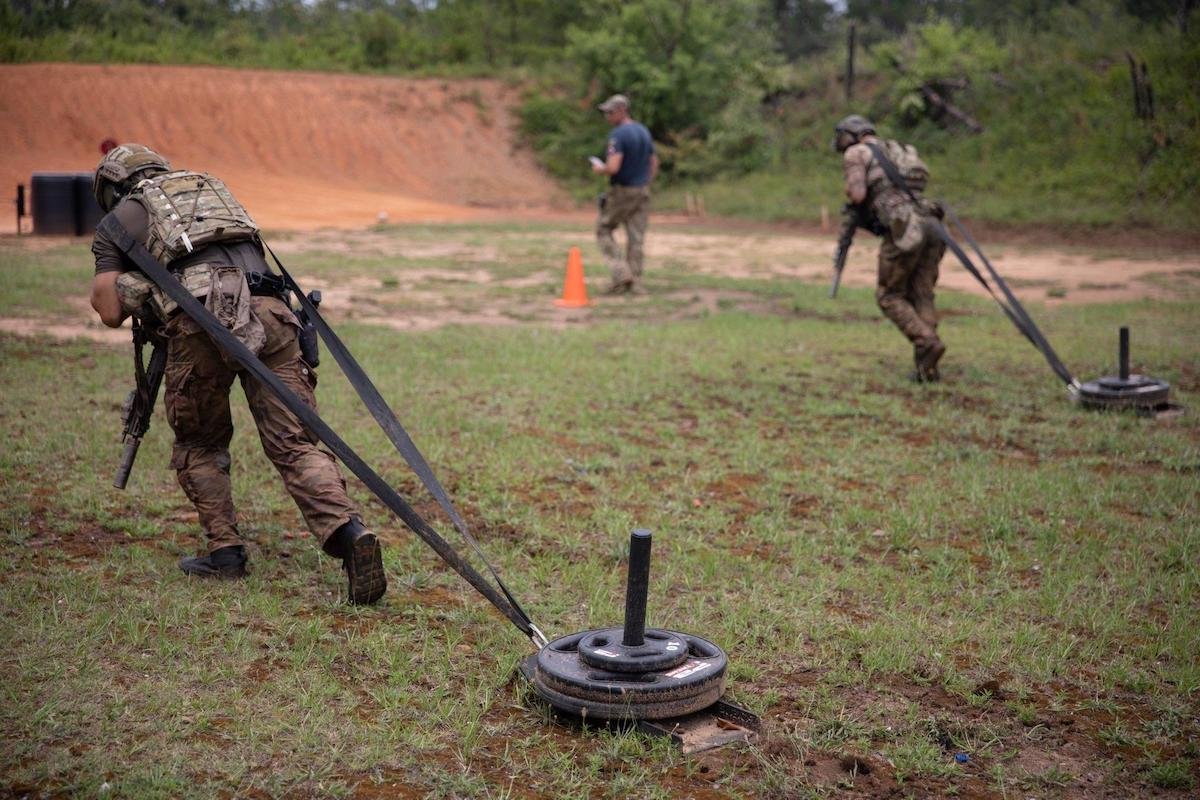
Rob said even more competitors were originally slated to compete this week. Seventeen teams, including pairs from the Marine Forces Special Operations Command and Marine Corps Force Reconnaissance, signed up, but last-minute injuries, deployments, and other obstacles interfered.
Mike thinks earlier planning and relocating the competition would create more buzz. “We’re crossing our fingers that we’re able to hold it somewhere down South,” he said. Logistically, a competition at a beach makes sense — and it wouldn’t hurt the spectator turnout. All three dive schools are in Florida: the Army’s in Key West; the Marines’ and Air Force’s in Panama City Beach. And 7th Group is headquartered at Eglin Air Force Base, Florida.
Joe Phanton, a retired 3rd Group soldier who now advises the Combat Diver Foundation, praised his former colleagues for the competition’s growth. “It’s important to note that 3rd Group initiated this and grew it to what it is today,” Phanton said.
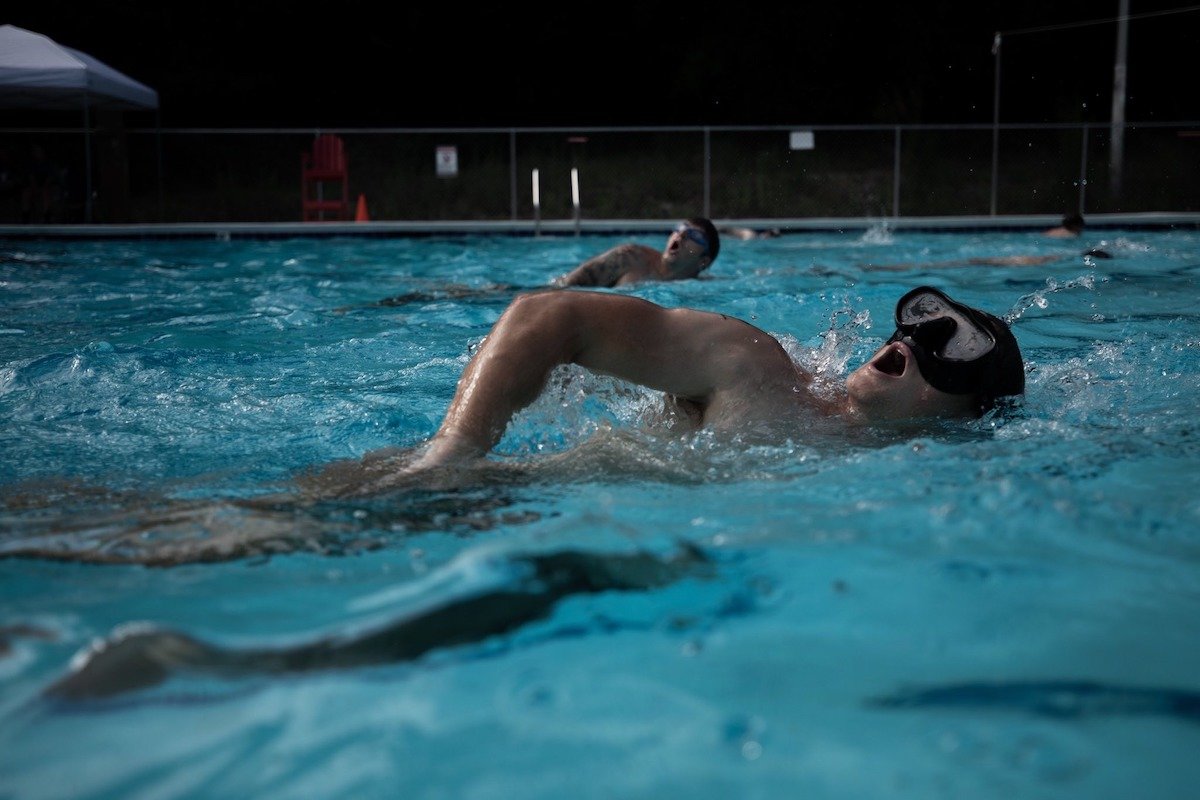
But he’s throwing down the gauntlet. “What we would like to see is this become even larger and include more of the diving community from other branches, such as the Marines and Navy, Air Force, so that it truly is a best diver competition,” Phanton said. “I think it would be a really good friendly rivalry between the branches of service.”
Sgt. 1st Class Tory A. and Capt. Drew F. from the US Army’s 7th Special Forces Group proved themselves the best of the best, taking first place. Full names were unavailable because of all competitors serving in special operations on active duty. The full results of the Best Combat Diver Competition were announced in an awards ceremony Thursday:
Team Results, 2022 Best Combat Diver Competition:
- 7th Group
- 3rd Group
- 7th Group
- 3rd Group
- 3rd Group
- 7th Group
- 5th Group
- 1st Group
- 3rd Group/14th ASOS
Read Next:
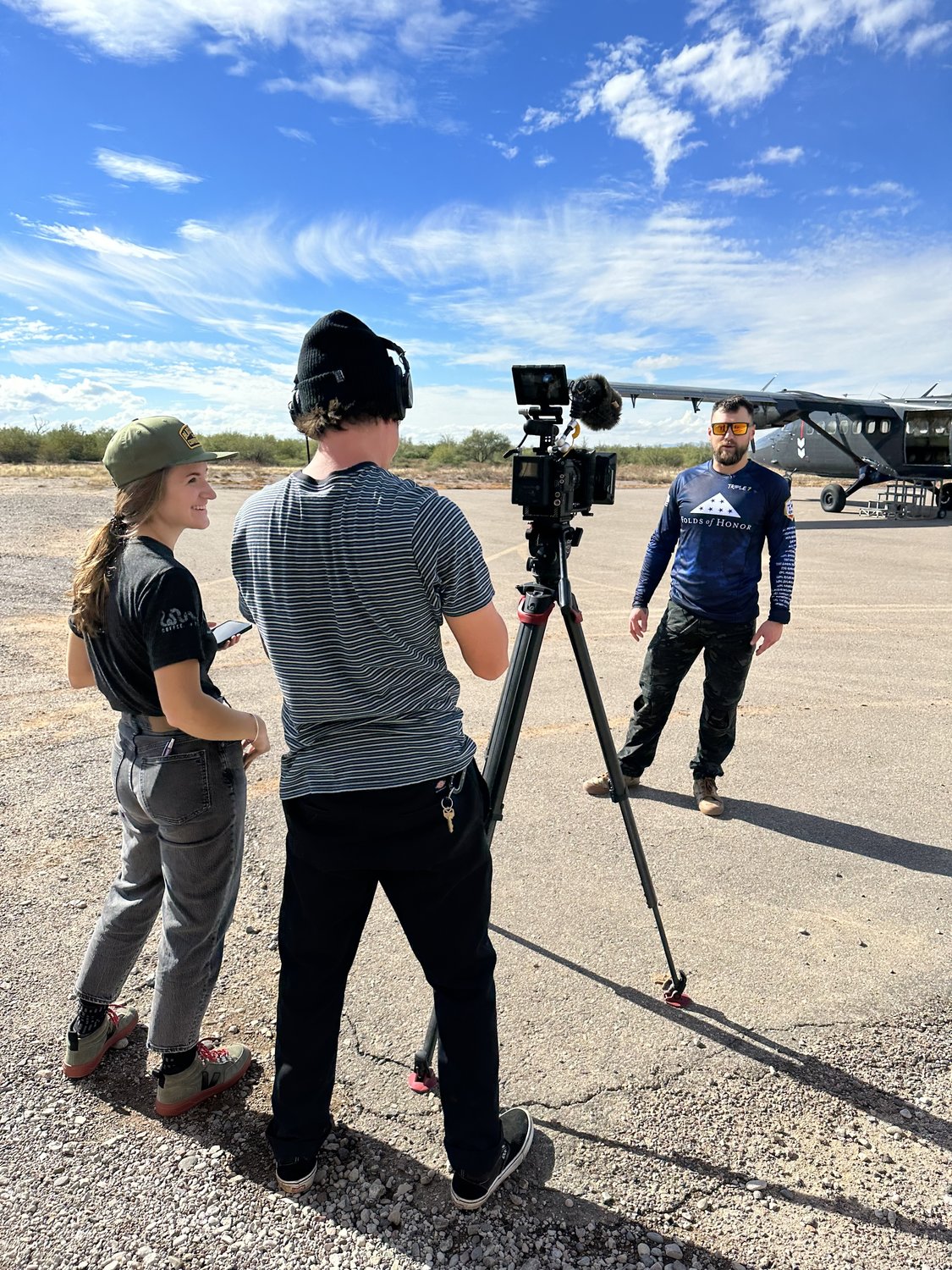
Jenna Biter is a staff writer at Coffee or Die Magazine. She has a master’s degree in national security and is a Russian language student. When she’s not writing, Jenna can be found reading classics, running, or learning new things, like the constellations in the night sky. Her husband is on active duty in the US military. Know a good story about national security or the military? Email Jenna.
BRCC and Bad Moon Print Press team up for an exclusive, limited-edition T-shirt design!
BRCC partners with Team Room Design for an exclusive T-shirt release!
Thirty Seconds Out has partnered with BRCC for an exclusive shirt design invoking the God of Winter.
Lucas O'Hara of Grizzly Forge has teamed up with BRCC for a badass, exclusive Shirt Club T-shirt design featuring his most popular knife and tiomahawk.
Coffee or Die sits down with one of the graphic designers behind Black Rifle Coffee's signature look and vibe.
Biden will award the Medal of Honor to a Vietnam War Army helicopter pilot who risked his life to save a reconnaissance team from almost certain death.
Ever wonder how much Jack Mandaville would f*ck sh*t up if he went back in time? The American Revolution didn't even see him coming.
A nearly 200-year-old West Point time capsule that at first appeared to yield little more than dust contains hidden treasure, the US Military Academy said.












